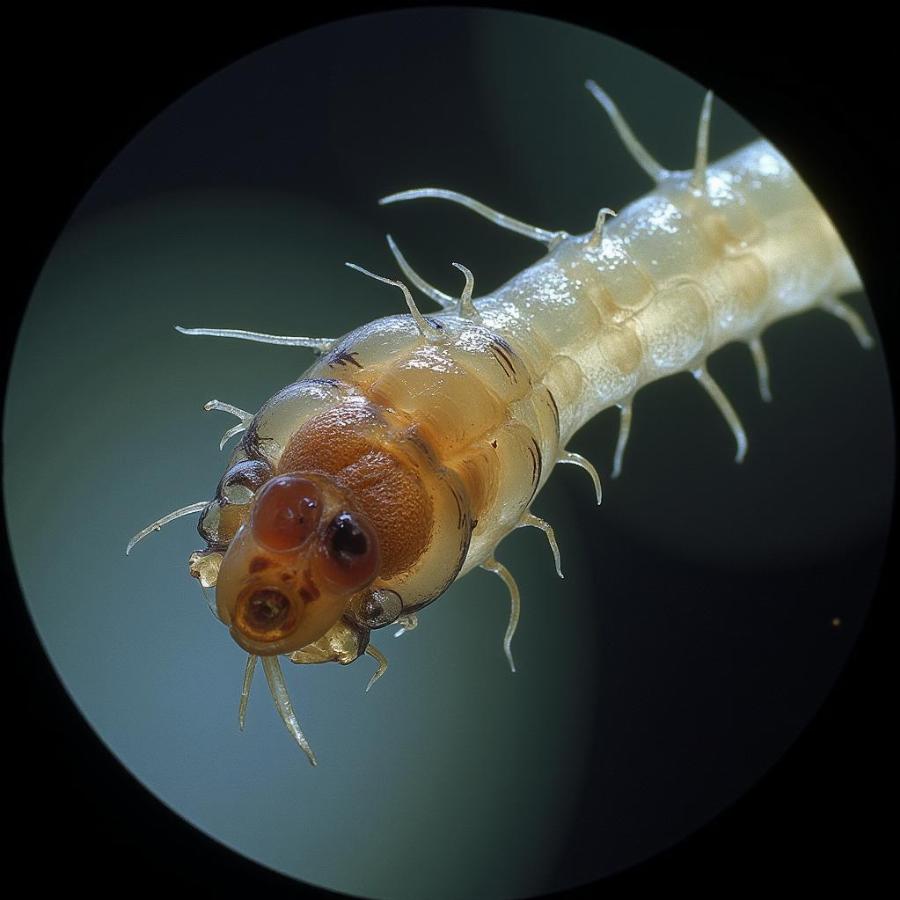Hookworms are nasty little parasites that can cause big problems for our furry friends. These intestinal worms latch onto your dog’s intestinal lining and feed on their blood, leading to a host of health issues if left untreated. If you suspect your dog has hookworms, a trip to the vet is in order. Let’s dive into how you can treat these pesky parasites and keep your canine companion healthy.
Understanding Hookworms in Dogs
Before we discuss treatment, it’s important to understand what we’re dealing with. Hookworms are tiny, thin worms that live in the intestines of dogs. They get their name from their hook-like mouths, which they use to attach to the intestinal wall and draw blood.
 Dog hookworm under microscope
Dog hookworm under microscope
Dogs can contract hookworms in several ways:
- Ingesting larvae: Hookworm larvae can live in contaminated soil or feces. Dogs can accidentally ingest them while sniffing around or grooming themselves.
- Through the skin: Larvae can also burrow through a dog’s skin, often through their paws when walking on contaminated ground.
- From mother to puppies: Puppies can contract hookworms from their mother’s milk.
Recognizing the Signs of Hookworms
Hookworm infections can range from mild to severe. Recognizing the signs early on is key to getting your dog the treatment they need. Here’s what to watch out for:
- Anemia: Because hookworms feed on blood, anemia is a common symptom, especially in puppies. You might notice pale gums, lethargy, and weakness.
- Diarrhea: Often accompanied by blood, diarrhea is a telltale sign of a hookworm infestation.
- Weight loss: Despite having a normal appetite, your dog might lose weight due to the parasites stealing nutrients.
- Poor coat condition: A dull, dry coat can be a sign of underlying health issues, including hookworms.
- Itchy paws: If your dog has itchy paws, especially between the toes, it could be a sign of hookworms burrowing into their skin.
Diagnosing and Treating Hookworms
If you suspect your dog has hookworms, don’t hesitate to contact your veterinarian. They will perform a fecal examination to check for hookworm eggs under a microscope.
Once diagnosed, your vet will prescribe a deworming medication to eliminate the parasites. These medications typically come in oral forms, such as tablets or liquids. It’s crucial to follow your vet’s instructions carefully and complete the full course of treatment, even if your dog’s symptoms improve. This will help ensure all worms are eliminated and reduce the risk of reinfection.
Preventing Hookworms in Dogs
Prevention is always better than cure. Here are some effective ways to protect your dog from hookworms:
- Regular deworming: Puppies require frequent deworming, and adult dogs benefit from regular preventative treatments as recommended by your veterinarian.
- Fecal exams: Regular fecal exams, even for seemingly healthy dogs, can help detect hookworms early.
- Environmental hygiene: Promptly clean up your dog’s feces and dispose of it properly. This will help prevent the spread of hookworm eggs in your yard and neighborhood.
- Avoid contaminated areas: Be cautious about letting your dog roam in areas known to be contaminated with feces, such as dog parks with poor hygiene.
Frequently Asked Questions About Hookworms in Dogs
Can I get hookworms from my dog?
Yes, some species of hookworms can be transmitted from dogs to humans. However, human infections are generally mild. Always practice good hygiene, such as washing your hands after handling your dog or their waste, to minimize the risk of transmission.
How long does it take for hookworms to go away after treatment?
Most deworming medications will kill adult hookworms within a few days. However, it’s important to complete the full course of treatment as prescribed by your vet to ensure all worms, including developing larvae, are eliminated.
Can I treat my dog’s hookworms at home without seeing a vet?
While there are over-the-counter deworming products available, it’s always best to consult with your veterinarian for proper diagnosis and treatment. They can determine the best course of action based on your dog’s age, health, and the severity of the infection.
What happens if hookworms are left untreated?
Untreated hookworm infections can lead to serious health problems, especially in puppies. Anemia, weight loss, and intestinal damage are some potential consequences. In severe cases, it can even be fatal.
Protecting Your Dog From Hookworms
Hookworms are a common but preventable parasite that can cause significant discomfort and health problems for your beloved dog. By understanding the risks, recognizing the signs, and taking preventative measures, you can help keep your furry friend happy, healthy, and worm-free. If you have any concerns about hookworms or your dog’s health, don’t hesitate to reach out to your veterinarian.
Do you have other questions about how to keep your dog healthy and parasite-free? Contact us at [email protected] for personalized advice and support from our team of dog experts at Beaut Dogs**. We’re here to help you navigate the world of dog ownership with confidence!